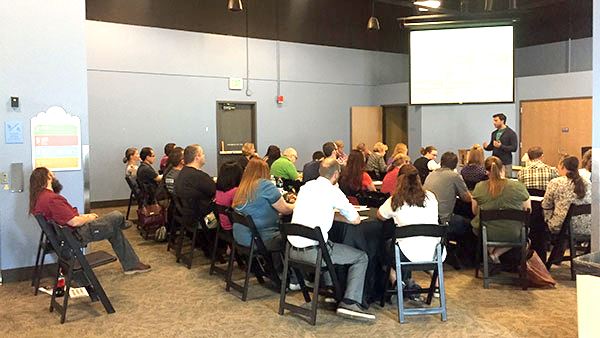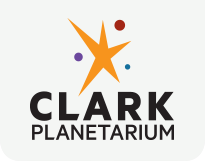For Educators
Clark Planetarium offers classroom resources and lesson plans. In addition, we also offer professional development workshops for teachers.

Professional Development Workshops for Teachers
Workshops typically are scheduled through district science specialists and can be taught on-site for a single district or for several districts together. Some workshops can only be scheduled if funding is available, and some may offer resource kits teachers can take back to their schools. E-mail clarkeducation@slco.org with questions.
4th Grade SEEd Astronomy – Curriculum for Utah 4th grade SEEd 4.4
Why is the Sun so much brighter than other stars? Why do the Sun, Moon and stars appear to move across the sky? Clark Planetarium has developed kinesthetic activities to help your students engage in science practices to explain these phenomena, and produced a teacher resource kit with all the materials used in these activities.
Seasons and Moon Phases – Curriculum for Utah 6th grade SEEd 6.1.1
In this training, learn how to demonstrate the phenomena of seasons and moon phases. In addition, learn how to guide students through investigations of the causes.
This workshop meets 6th-grade SEEd standards, and it includes training on using the “Seasons and Moon Phases” teacher resource kits. For information about your district contact and to request a “Seasons and Moon Phases” teacher resource kit, contact clarkeducation@slco.org.
Density – Curriculum for 6th-grade SEEd 6.1, 6.2, and 6.3
This curriculum helps students develop an understanding of density – a core concept of standard 6.2. These lessons scaffold upward, starting with planets and moons (6.1.3), moving on to molecules and phase changes (6.2), and ending with the water cycle (6.3.1).
Heat Transfer – Curriculum for 6th-grade SEEd 6.2, and 6.3
- MASTER Heat Transfer Teacher Manual (Download PDF document)
- MASTER Heat Transfer Activity (Download PowerPoint document)
- Heat Transfer Student Data Sheet (Download PDF document)
- Heat Transfer Activity Data Chart – Blank (Download Excel Spreadsheet)
- Heat Transfer Data Chart and Comparisons (Download Excel Spreadsheet)
Universe Sandbox
Universe Sandbox is an interactive physics-based space simulation. This “video game” program allows teachers and students to explore gravity and the movement of objects in space. In this workshop, Clark educators will introduce educators to the program, guide them in using the software for both demonstrations, and provide student-led lesson plans. Attending educators will each receive a license to install the software at their school.
Curriculum and Lessons
Clark Planetarium offers digital versions of its teacher professional development sessions. They can be downloaded from the links shown below. For questions about the materials, or to inquire about professional development opportunities, contact us at 385-468-1248 or clarkeducation@slco.org.
6th-grade Seasons and Moon Phase Activity Kits (Kits meet SEEd standards)
-
MASTER Seasons and Moon Phases Kit Curriculum with Worksheets (Download PDF document)
-
MASTER Seasons and Moon Phases Kit Curriculum (Download PDF document)
Instructions for Kinesthetic Astronomy Kit Activities
Resources for SEEd Density Activities
Some of the PowerPoint slides have notes with additional information.
Standard 6.1.3 – Structure of the Solar System
Standard 6.2.1 – Atoms and Molecules
Standard 6.2.2 – Heat Energy and Phase Changes
Standard 6.3.1 – The Water Cycle
-
Activity 2 - Effects of Uneven Heating on Density (Download Word document)
-
Activity 3 – Cycling Water Through Earth Systems (Download PDF document)
Standard 6.3.3 – Heat and Atmospheric/Oceanic Circulation
Universe Sandbox Lesson Plans
Heat Transfer – Curriculum for 6th-grade SEEd 6.2, and 6.3
- MASTER Heat Transfer Teacher Manual (Download PDF document)
- MASTER Heat Transfer Activity (Download PowerPoint document)
- Heat Transfer Student Data Sheet (Download PDF document)
- Heat Transfer Activity Data Chart – Blank (Download Excel Spreadsheet)
- Heat Transfer Data Chart and Comparisons (Download Excel Spreadsheet)
Fourth Grade Astronomy Kit Activities
Teacher Resources
Scavenger Hunts
Prepare your class for a field trip with an exploration guide and scavenger hunts for our exhibits. Each guide is targeted towards particular grade levels or a general audience.
- 4th-grade Exploration Guide and Scavenger Hunt (Download PDF), Key (Download PDF document)
- 6th-grade Exploration Guide and Scavenger Hunt (Download PDF document), Key (Download PDF document)
- Scavenger Hunt (General Public) (Download PDF document)
- Scavenger Hunt (Parents with Young Children) (Download PDF document)
- Solar System Fact Sheet (Download PDF document)
Astronomy Resources
- Extra-solar Planets Encyclopedia – Catalog of potential planets beyond our Solar System
- Figures In the Sky – A diverse set of constellations with stories about local legends and myths
- Pluto & the New Horizons Mission
- Solar System Live – The interactive Orrery of the Web. You can view the entire Solar System, or just the inner planets (through the orbit of Mars)
- The Eight Planets – Multimedia Tour of the Solar System
- Telescope Information - Private site. Good general information on telescopes.
- Jet Propulsion Laboratories
- NASA – The gateway for all the space stuff. Look specifically at the “what’s new” section
- Hubble Space Telescope
- Hubble Space Telescope Science Institute – Great source for the latest images from Hubble
- Voyage to Saturn
- Project Galileo
- NASA Worldview – Browse up-to-date global satellite imagery
- NASA’s Eyes – an immersive app to explore the Solar System through NASA missions
- SOS Explorer – A mobile app version of Clark Planetarium’s Science on a Sphere global data sets
- Earth/Wind Map– More than just a map of the Earth’s wind patterns, users can view data on global weather and air patterns
- Stellarium
- Time and Date
Education Resources
- National Science Teachers Association
- NASA’s Earth Observatory
- Utah State Science Core – All science teachers should know about this link!
- International Planetarium Society
- Ott Planetarium at Weber State University


